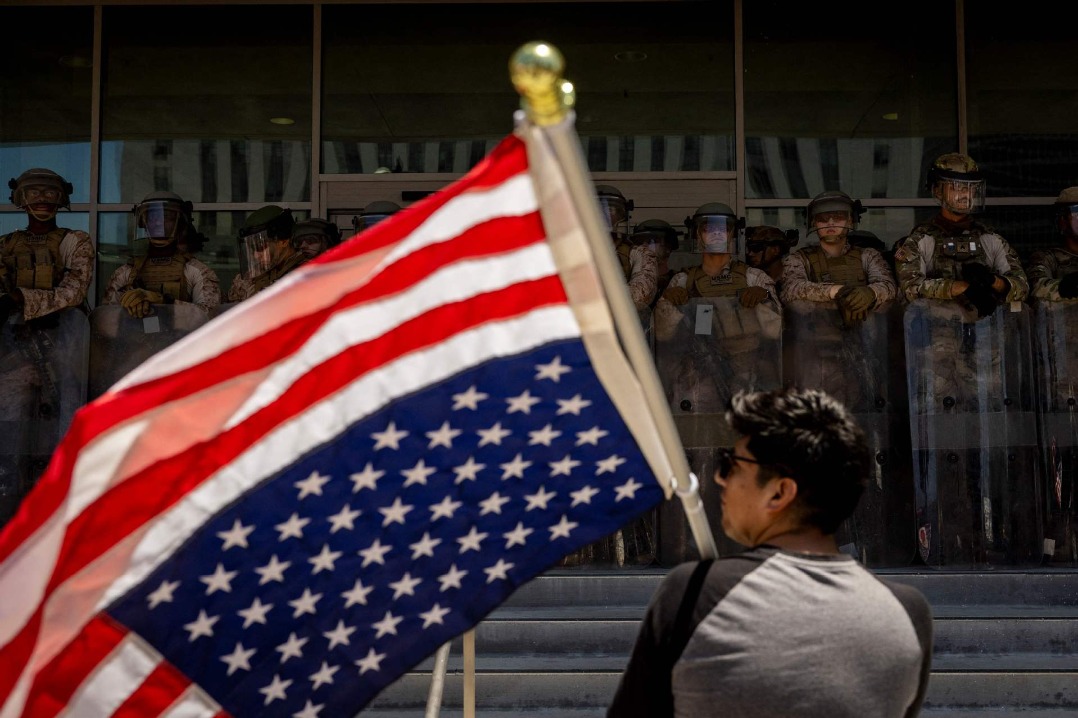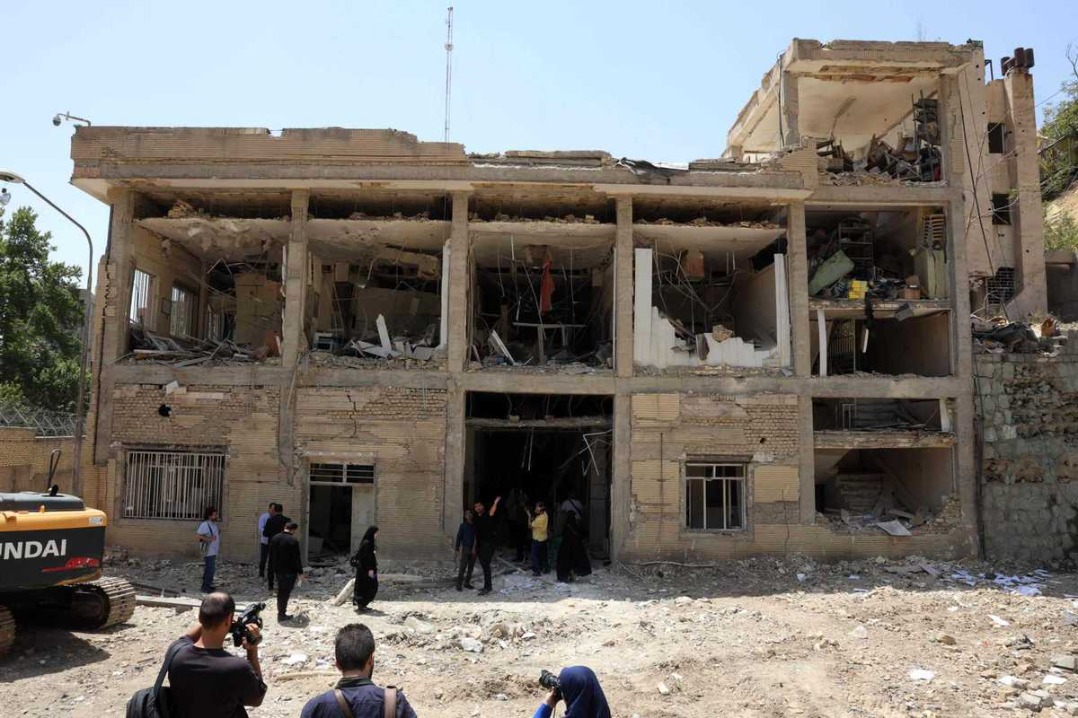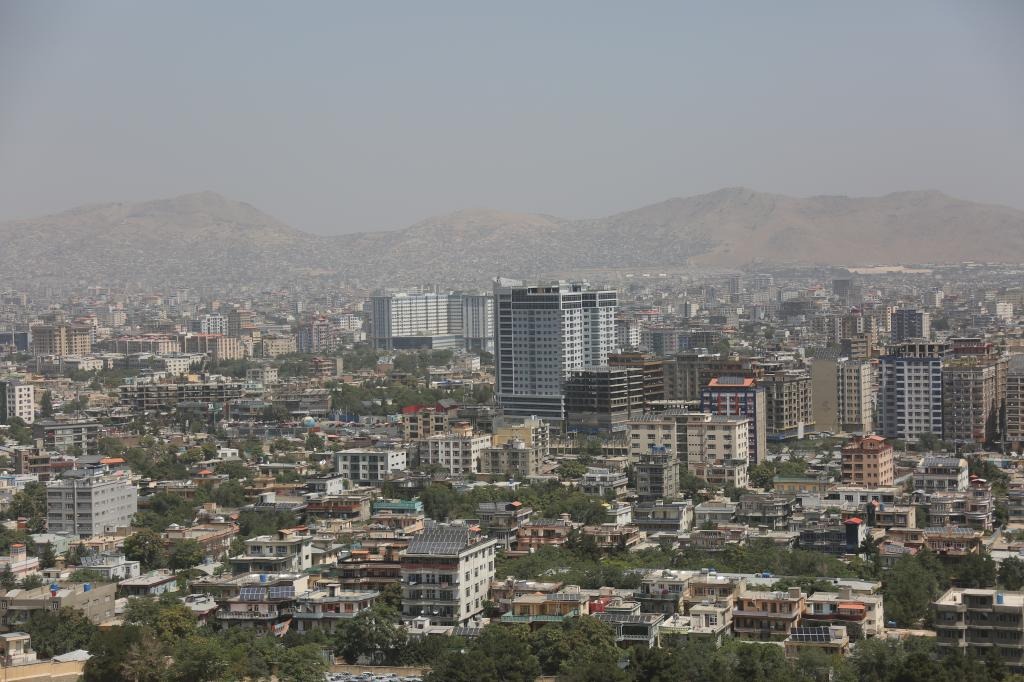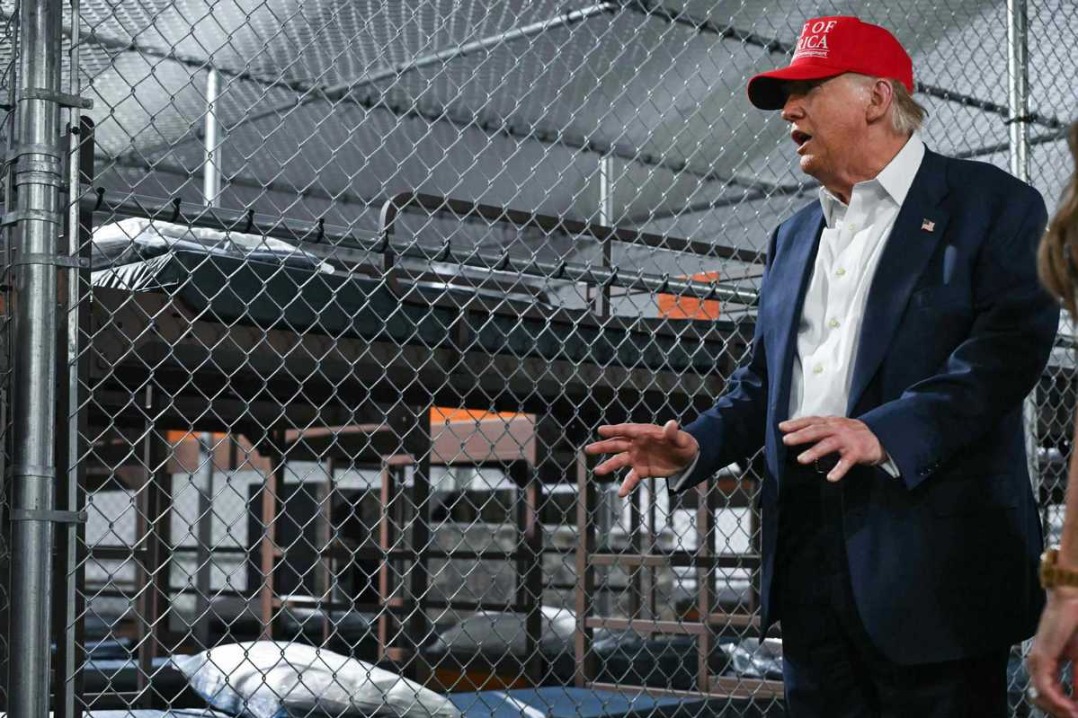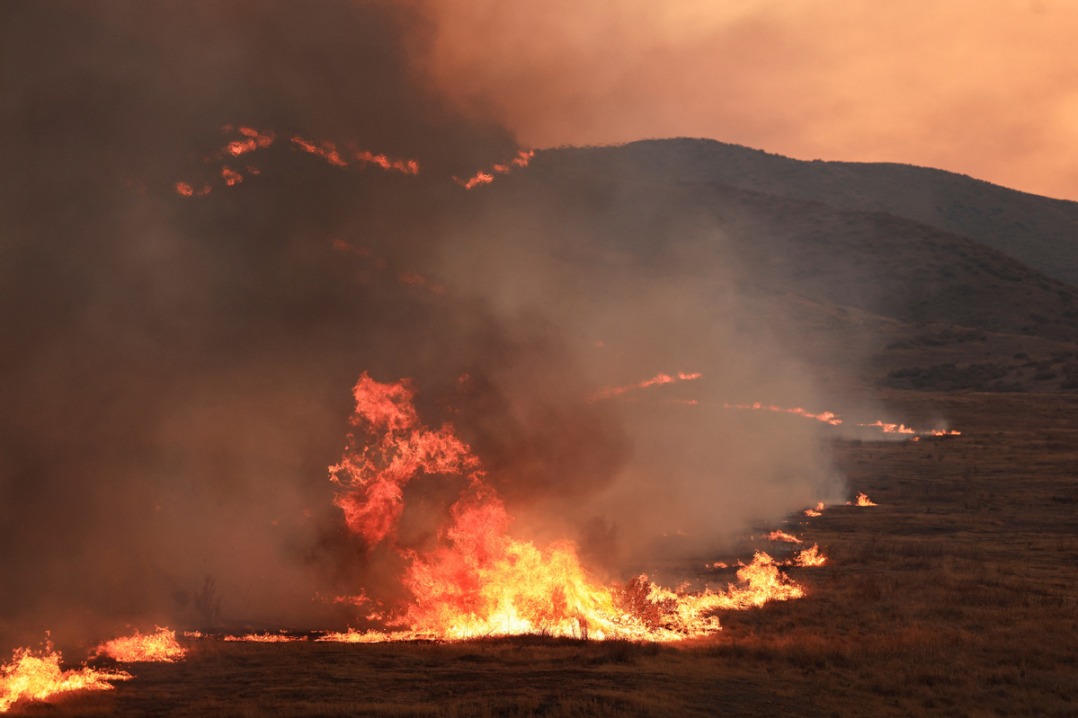Trump welcomes Hamas' 'positive' response to ceasefire proposal
Gaza braces for continued Israeli bombardment ahead of Trump-Netanyahu meet

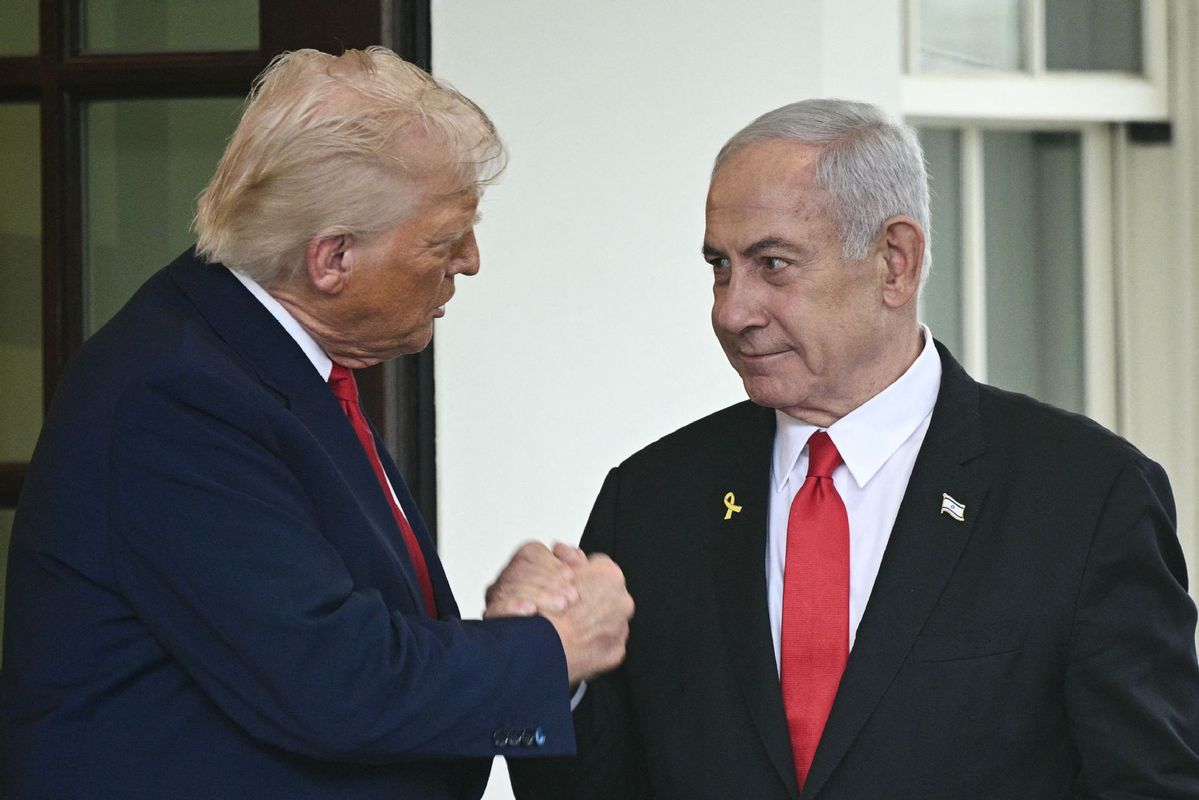
United States President Donald Trump welcomed Palestinian militant group Hamas' "positive" response to mediators regarding a latest ceasefire proposal.
Trump told reporters on Friday aboard Air Force One that it was "good" that Hamas said it had responded in "a positive spirit" to a Washington-brokered Gaza ceasefire proposal. He was hoping there could be a deal by next week. But he also said he had not been briefed on the current state of negotiations, according to a Reuters report.
Israel has received Hamas's response on the Gaza ceasefire proposal with details currently being examined, according to a report by The Times of Israel, citing Israeli officials.
Trump had said that he would be "very firm" with Israeli Prime Minister Benjamin Netanyahu on the need to end the war in Gaza when the premier visits Washington next week.
Hamas said in a statement on Friday night that it has delivered a "positive" response to mediators over a Gaza ceasefire proposal.
"Hamas has completed its consultations with Palestinian factions and forces on the mediators' latest proposal to stop the aggression against our people in Gaza. The movement has delivered its response to the mediators, which was positive," the statement was quoted as saying by Xinhua News Agency.
"The movement is seriously prepared to immediately enter into a round of negotiations on the mechanism for implementing this framework," it added.
The latest developments come just days before Trump is scheduled to host Netanyahu in Washington on July 7.
Hamas ally Islamic Jihad said on Saturday that it supports plans for talks between the Palestinian group and Israel on a truce in Gaza, but they demanded "guarantees" that the process would lead to a permanent ceasefire – one of the most contentious points in the negotiations.
"We presented (Hamas) a number of detailed points on the mechanism for putting in place the mediators' proposal, and we want additional guarantees to assure us (that Israel) will not resume its aggression after (the captives) are freed," the Islamic Jihad's statement was quoted as saying by Al Jazeera.
Al Jazeera reported that according to a translated copy of the framework, the deal would include a 60-day truce, guaranteed by Trump, with a release of Israeli captives in different phases and increased humanitarian aid.
The proposed exchange includes the release of 10 living and 18 deceased Israeli captives from the "List of 58". The releases would take place on days one, seven, 30, 50, and 60 – starting with eight live captives on the first day.
Under the plan, aid would flow into Gaza immediately after Hamas' approval, in quantities comparable to the January 2025 agreement, the Al Jazeera report said. Distribution would be managed by agencies such as the United Nations and the Palestine Red Crescent Society.
Regarding Israeli military operations, it would stop once the agreement comes into effect, Al Jazeera has learned.
The deal includes a pause in military and surveillance flights over Gaza for 10 hours each day or 12 hours on days when captives and prisoners are exchanged.
Talks for a permanent ceasefire arrangement would begin on day one under the supervision of mediators and negotiations would cover a full exchange of captives for Palestinian prisoners, Israeli troop withdrawal, future security arrangements, and "day-after" plans for Gaza.
Meanwhile, the head of a group representing over 550 former senior Israeli security officials had urged Trump to leverage his upcoming meeting with Netanyahu to end the war in Gaza.
"It is our professional judgement that the IDF (Israel Defense Forces) has long accomplished its dual mission of dismantling Hamas governance and essentially destroying its military capabilities," Commanders for Israel's Security chair Maj. Gen. (ret) Matan Vilnai was quoted as saying by the Times of Israel in his letter to Trump.
Further, he said Hamas no longer poses a strategic threat to Israel, and as demonstrated this year on multiple fronts, Israel possesses overwhelming power and ability to neutralize any threat that might arise from Gaza in the future.
At a news conference in Moscow where he is currently visiting, Saudi Foreign Minister Prince Faisal bin Farhan Al-Saud reiterated that it was Saudi Arabia's priority to end the war in Gaza "as a prelude to the establishment of a Palestinian state".
His comments came a day after Trump reportedly hosted Saudi Defense Minister Khalid bin Farhan Al-Saud to discuss Iran and other regional issues, including the so-called normalization with Israel amid swirling reports that the US was looking to secure Israeli-Saudi and Israeli-Syrian normalization.
Prince Faisal Al-Saud called for an immediate, permanent and sustainable ceasefire in the Gaza Strip as a prelude to the establishment of a Palestinian state.
In June, Saudi Arabia and France, co-chair the United Nations Conference on the Peaceful Settlement of the Palestinian Question, were forced to postpone the high-profile conference after Israel launched pre-emptive strikes on Iran on June 13.
Belal Alakhras, a political analyst and researcher at the University of Malaya in Kuala Lumpur, told China Daily that the latest developments are a critical juncture not just for Gaza, but for the entire region, as both the Israeli government and their Washington backers "face complex choices on ceasefire terms and broader Middle East strategy within a narrow window".
"The regional situation remains volatile, with Israeli government displaying dangerous hubris and delusions about controlling the region, despite their clear blowback and significant daily losses within the narrow Gaza after more than 630 days of total warfare and genocide that rather created tragic massacres and massive civilian destruction," said Alakhras.
"The Israeli mentality operates from a position of supremacy, while peoples across the region view the Israeli occupation as aggressive and hostile, and the Gaza war has only deepened this antagonism, making genuine stability almost impossible for time being when the Israeli occupation positions itself as an intrusive force with unlimited Western support and military capabilities," he added.
Despite the developments in ceasefire negotiations, Israel intensified its bombardment.
At least 19 Palestinians were killed in the early hours of July 5 as Israeli forces launched a series of deadly airstrikes and artillery attacks across several areas of the Gaza Strip, according to a report by Wafa News Agency. A Palestinian Red Crescent ambulance was also attacked on Friday evening during a violent raid on Jabal Qamas.
















